Grand Canyon University PHI 413V: Fetal Abnormality Case Study
VerifiedAdded on 2023/06/09
|7
|1534
|446
Case Study
AI Summary
This case study examines the ethical dilemma of a fetal abnormality, specifically a fetus with a 25% chance of Down Syndrome and a missing arm. It analyzes the moral theories used by four individuals: Jessica (the mother), Marco (the father), Maria (the aunt), and Dr. Wilson. Jessica's potential use of feminist theory, Marco's support for Jessica and consideration of financial strain, Maria's reliance on religious beliefs and the relationship theory, and Dr. Wilson's virtue ethics-based medical advice are all explored. The analysis concludes by advocating for the doctor's recommendation of terminating the pregnancy due to the predicted abnormal growth and potential suffering of the child, citing legal considerations for termination within the 24th week of fetal development. The document is contributed by a student and available on Desklib, a platform providing AI-based study tools for students.
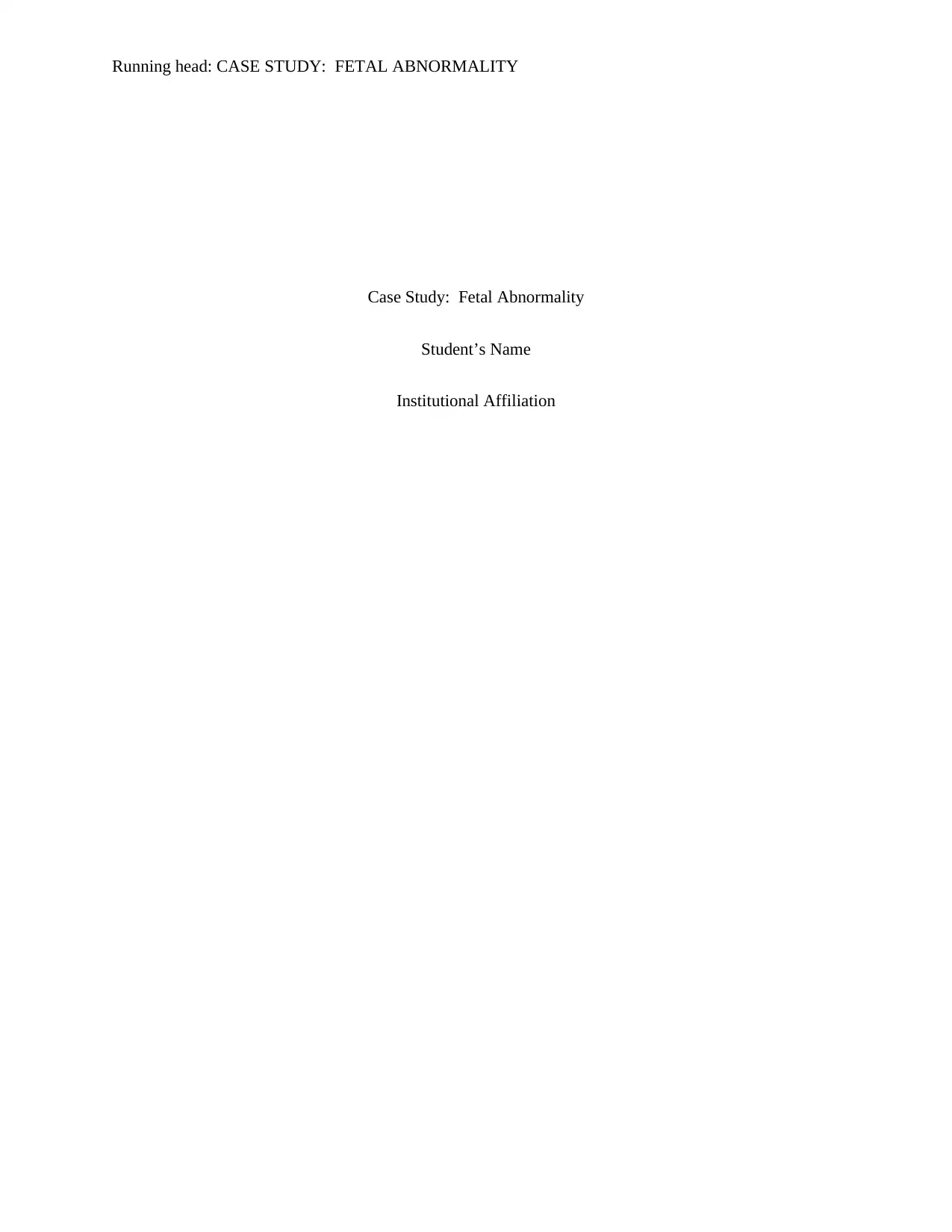
Running head: CASE STUDY: FETAL ABNORMALITY
Case Study: Fetal Abnormality
Student’s Name
Institutional Affiliation
Case Study: Fetal Abnormality
Student’s Name
Institutional Affiliation
Paraphrase This Document
Need a fresh take? Get an instant paraphrase of this document with our AI Paraphraser
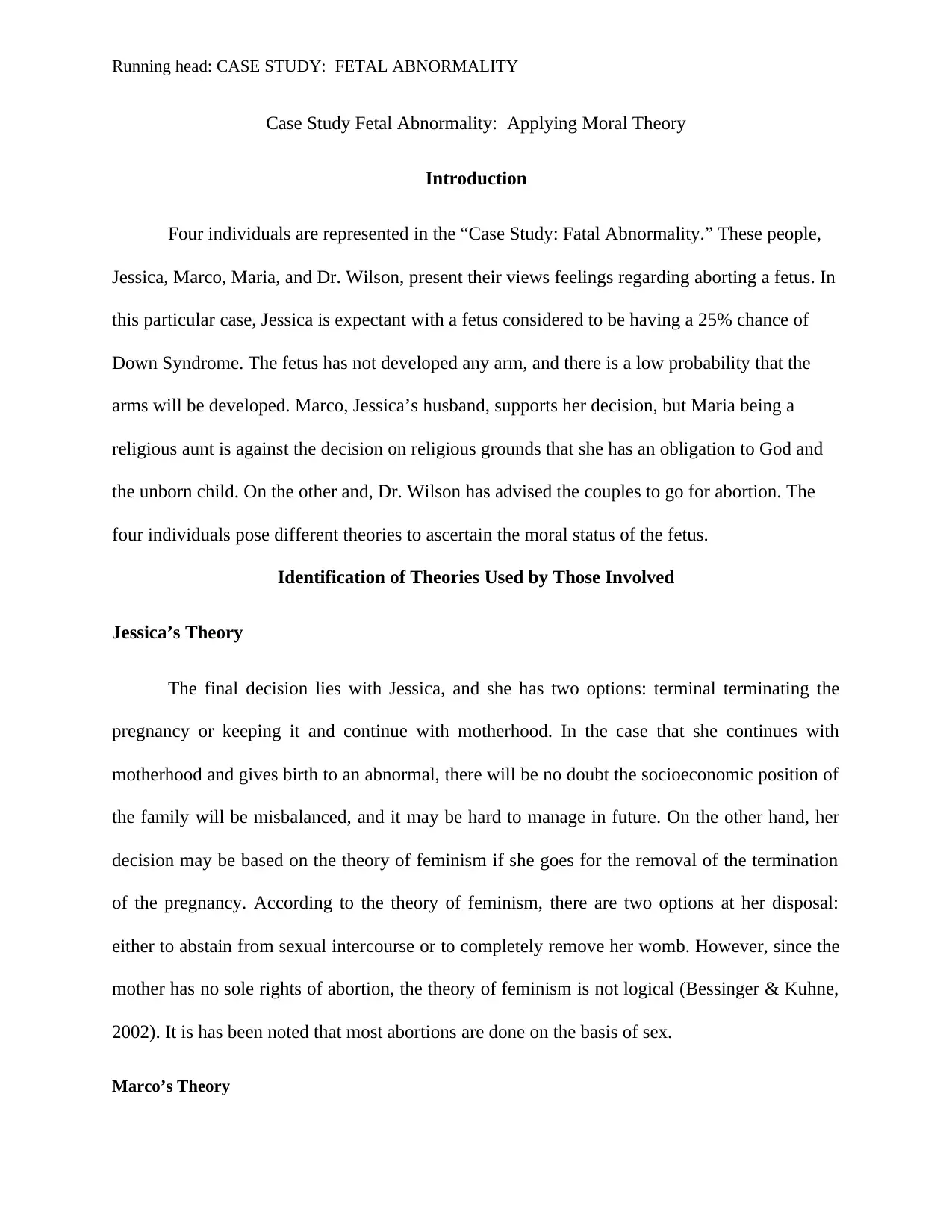
Running head: CASE STUDY: FETAL ABNORMALITY
Case Study Fetal Abnormality: Applying Moral Theory
Introduction
Four individuals are represented in the “Case Study: Fatal Abnormality.” These people,
Jessica, Marco, Maria, and Dr. Wilson, present their views feelings regarding aborting a fetus. In
this particular case, Jessica is expectant with a fetus considered to be having a 25% chance of
Down Syndrome. The fetus has not developed any arm, and there is a low probability that the
arms will be developed. Marco, Jessica’s husband, supports her decision, but Maria being a
religious aunt is against the decision on religious grounds that she has an obligation to God and
the unborn child. On the other and, Dr. Wilson has advised the couples to go for abortion. The
four individuals pose different theories to ascertain the moral status of the fetus.
Identification of Theories Used by Those Involved
Jessica’s Theory
The final decision lies with Jessica, and she has two options: terminal terminating the
pregnancy or keeping it and continue with motherhood. In the case that she continues with
motherhood and gives birth to an abnormal, there will be no doubt the socioeconomic position of
the family will be misbalanced, and it may be hard to manage in future. On the other hand, her
decision may be based on the theory of feminism if she goes for the removal of the termination
of the pregnancy. According to the theory of feminism, there are two options at her disposal:
either to abstain from sexual intercourse or to completely remove her womb. However, since the
mother has no sole rights of abortion, the theory of feminism is not logical (Bessinger & Kuhne,
2002). It is has been noted that most abortions are done on the basis of sex.
Marco’s Theory
Case Study Fetal Abnormality: Applying Moral Theory
Introduction
Four individuals are represented in the “Case Study: Fatal Abnormality.” These people,
Jessica, Marco, Maria, and Dr. Wilson, present their views feelings regarding aborting a fetus. In
this particular case, Jessica is expectant with a fetus considered to be having a 25% chance of
Down Syndrome. The fetus has not developed any arm, and there is a low probability that the
arms will be developed. Marco, Jessica’s husband, supports her decision, but Maria being a
religious aunt is against the decision on religious grounds that she has an obligation to God and
the unborn child. On the other and, Dr. Wilson has advised the couples to go for abortion. The
four individuals pose different theories to ascertain the moral status of the fetus.
Identification of Theories Used by Those Involved
Jessica’s Theory
The final decision lies with Jessica, and she has two options: terminal terminating the
pregnancy or keeping it and continue with motherhood. In the case that she continues with
motherhood and gives birth to an abnormal, there will be no doubt the socioeconomic position of
the family will be misbalanced, and it may be hard to manage in future. On the other hand, her
decision may be based on the theory of feminism if she goes for the removal of the termination
of the pregnancy. According to the theory of feminism, there are two options at her disposal:
either to abstain from sexual intercourse or to completely remove her womb. However, since the
mother has no sole rights of abortion, the theory of feminism is not logical (Bessinger & Kuhne,
2002). It is has been noted that most abortions are done on the basis of sex.
Marco’s Theory
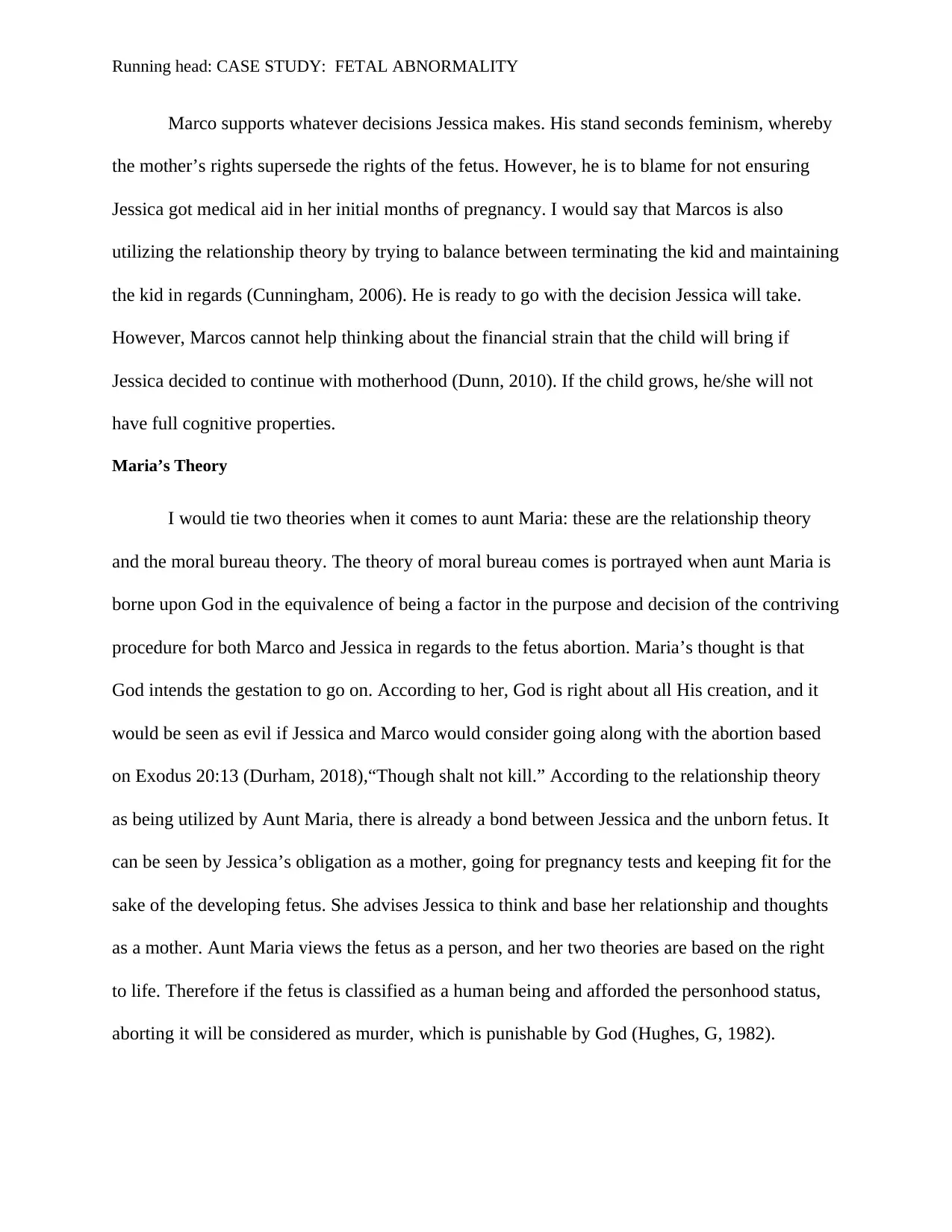
Running head: CASE STUDY: FETAL ABNORMALITY
Marco supports whatever decisions Jessica makes. His stand seconds feminism, whereby
the mother’s rights supersede the rights of the fetus. However, he is to blame for not ensuring
Jessica got medical aid in her initial months of pregnancy. I would say that Marcos is also
utilizing the relationship theory by trying to balance between terminating the kid and maintaining
the kid in regards (Cunningham, 2006). He is ready to go with the decision Jessica will take.
However, Marcos cannot help thinking about the financial strain that the child will bring if
Jessica decided to continue with motherhood (Dunn, 2010). If the child grows, he/she will not
have full cognitive properties.
Maria’s Theory
I would tie two theories when it comes to aunt Maria: these are the relationship theory
and the moral bureau theory. The theory of moral bureau comes is portrayed when aunt Maria is
borne upon God in the equivalence of being a factor in the purpose and decision of the contriving
procedure for both Marco and Jessica in regards to the fetus abortion. Maria’s thought is that
God intends the gestation to go on. According to her, God is right about all His creation, and it
would be seen as evil if Jessica and Marco would consider going along with the abortion based
on Exodus 20:13 (Durham, 2018),“Though shalt not kill.” According to the relationship theory
as being utilized by Aunt Maria, there is already a bond between Jessica and the unborn fetus. It
can be seen by Jessica’s obligation as a mother, going for pregnancy tests and keeping fit for the
sake of the developing fetus. She advises Jessica to think and base her relationship and thoughts
as a mother. Aunt Maria views the fetus as a person, and her two theories are based on the right
to life. Therefore if the fetus is classified as a human being and afforded the personhood status,
aborting it will be considered as murder, which is punishable by God (Hughes, G, 1982).
Marco supports whatever decisions Jessica makes. His stand seconds feminism, whereby
the mother’s rights supersede the rights of the fetus. However, he is to blame for not ensuring
Jessica got medical aid in her initial months of pregnancy. I would say that Marcos is also
utilizing the relationship theory by trying to balance between terminating the kid and maintaining
the kid in regards (Cunningham, 2006). He is ready to go with the decision Jessica will take.
However, Marcos cannot help thinking about the financial strain that the child will bring if
Jessica decided to continue with motherhood (Dunn, 2010). If the child grows, he/she will not
have full cognitive properties.
Maria’s Theory
I would tie two theories when it comes to aunt Maria: these are the relationship theory
and the moral bureau theory. The theory of moral bureau comes is portrayed when aunt Maria is
borne upon God in the equivalence of being a factor in the purpose and decision of the contriving
procedure for both Marco and Jessica in regards to the fetus abortion. Maria’s thought is that
God intends the gestation to go on. According to her, God is right about all His creation, and it
would be seen as evil if Jessica and Marco would consider going along with the abortion based
on Exodus 20:13 (Durham, 2018),“Though shalt not kill.” According to the relationship theory
as being utilized by Aunt Maria, there is already a bond between Jessica and the unborn fetus. It
can be seen by Jessica’s obligation as a mother, going for pregnancy tests and keeping fit for the
sake of the developing fetus. She advises Jessica to think and base her relationship and thoughts
as a mother. Aunt Maria views the fetus as a person, and her two theories are based on the right
to life. Therefore if the fetus is classified as a human being and afforded the personhood status,
aborting it will be considered as murder, which is punishable by God (Hughes, G, 1982).
⊘ This is a preview!⊘
Do you want full access?
Subscribe today to unlock all pages.

Trusted by 1+ million students worldwide
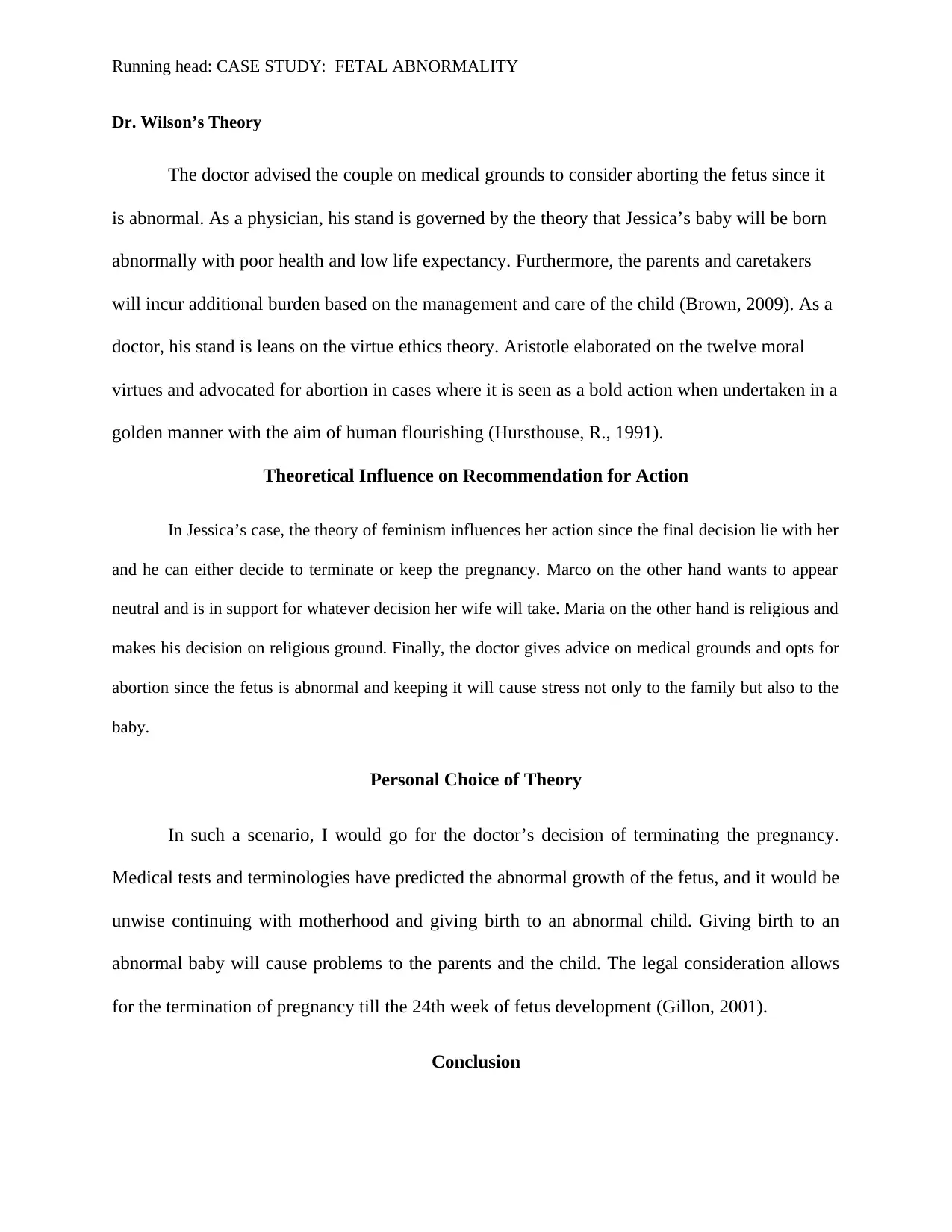
Running head: CASE STUDY: FETAL ABNORMALITY
Dr. Wilson’s Theory
The doctor advised the couple on medical grounds to consider aborting the fetus since it
is abnormal. As a physician, his stand is governed by the theory that Jessica’s baby will be born
abnormally with poor health and low life expectancy. Furthermore, the parents and caretakers
will incur additional burden based on the management and care of the child (Brown, 2009). As a
doctor, his stand is leans on the virtue ethics theory. Aristotle elaborated on the twelve moral
virtues and advocated for abortion in cases where it is seen as a bold action when undertaken in a
golden manner with the aim of human flourishing (Hursthouse, R., 1991).
Theoretical Influence on Recommendation for Action
In Jessica’s case, the theory of feminism influences her action since the final decision lie with her
and he can either decide to terminate or keep the pregnancy. Marco on the other hand wants to appear
neutral and is in support for whatever decision her wife will take. Maria on the other hand is religious and
makes his decision on religious ground. Finally, the doctor gives advice on medical grounds and opts for
abortion since the fetus is abnormal and keeping it will cause stress not only to the family but also to the
baby.
Personal Choice of Theory
In such a scenario, I would go for the doctor’s decision of terminating the pregnancy.
Medical tests and terminologies have predicted the abnormal growth of the fetus, and it would be
unwise continuing with motherhood and giving birth to an abnormal child. Giving birth to an
abnormal baby will cause problems to the parents and the child. The legal consideration allows
for the termination of pregnancy till the 24th week of fetus development (Gillon, 2001).
Conclusion
Dr. Wilson’s Theory
The doctor advised the couple on medical grounds to consider aborting the fetus since it
is abnormal. As a physician, his stand is governed by the theory that Jessica’s baby will be born
abnormally with poor health and low life expectancy. Furthermore, the parents and caretakers
will incur additional burden based on the management and care of the child (Brown, 2009). As a
doctor, his stand is leans on the virtue ethics theory. Aristotle elaborated on the twelve moral
virtues and advocated for abortion in cases where it is seen as a bold action when undertaken in a
golden manner with the aim of human flourishing (Hursthouse, R., 1991).
Theoretical Influence on Recommendation for Action
In Jessica’s case, the theory of feminism influences her action since the final decision lie with her
and he can either decide to terminate or keep the pregnancy. Marco on the other hand wants to appear
neutral and is in support for whatever decision her wife will take. Maria on the other hand is religious and
makes his decision on religious ground. Finally, the doctor gives advice on medical grounds and opts for
abortion since the fetus is abnormal and keeping it will cause stress not only to the family but also to the
baby.
Personal Choice of Theory
In such a scenario, I would go for the doctor’s decision of terminating the pregnancy.
Medical tests and terminologies have predicted the abnormal growth of the fetus, and it would be
unwise continuing with motherhood and giving birth to an abnormal child. Giving birth to an
abnormal baby will cause problems to the parents and the child. The legal consideration allows
for the termination of pregnancy till the 24th week of fetus development (Gillon, 2001).
Conclusion
Paraphrase This Document
Need a fresh take? Get an instant paraphrase of this document with our AI Paraphraser
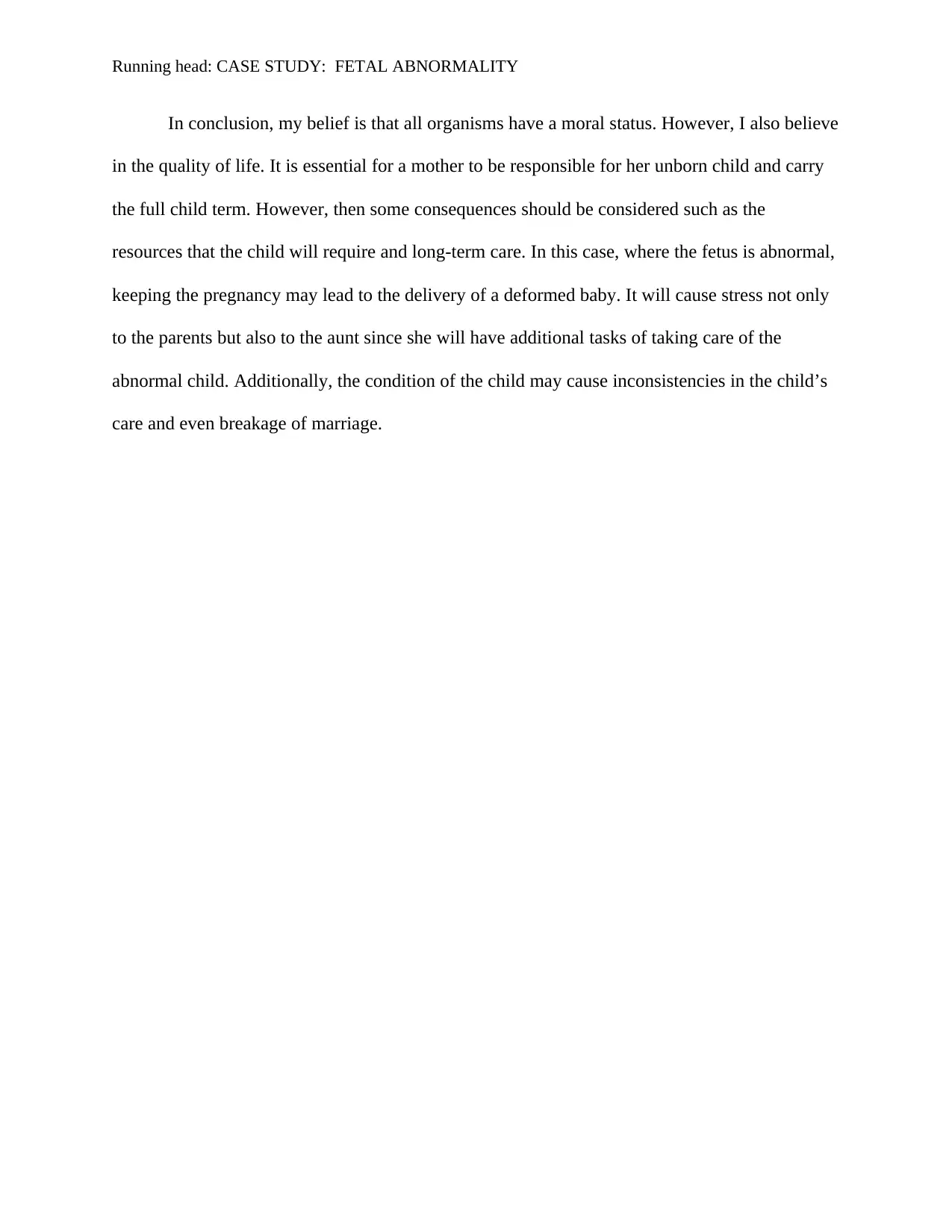
Running head: CASE STUDY: FETAL ABNORMALITY
In conclusion, my belief is that all organisms have a moral status. However, I also believe
in the quality of life. It is essential for a mother to be responsible for her unborn child and carry
the full child term. However, then some consequences should be considered such as the
resources that the child will require and long-term care. In this case, where the fetus is abnormal,
keeping the pregnancy may lead to the delivery of a deformed baby. It will cause stress not only
to the parents but also to the aunt since she will have additional tasks of taking care of the
abnormal child. Additionally, the condition of the child may cause inconsistencies in the child’s
care and even breakage of marriage.
In conclusion, my belief is that all organisms have a moral status. However, I also believe
in the quality of life. It is essential for a mother to be responsible for her unborn child and carry
the full child term. However, then some consequences should be considered such as the
resources that the child will require and long-term care. In this case, where the fetus is abnormal,
keeping the pregnancy may lead to the delivery of a deformed baby. It will cause stress not only
to the parents but also to the aunt since she will have additional tasks of taking care of the
abnormal child. Additionally, the condition of the child may cause inconsistencies in the child’s
care and even breakage of marriage.
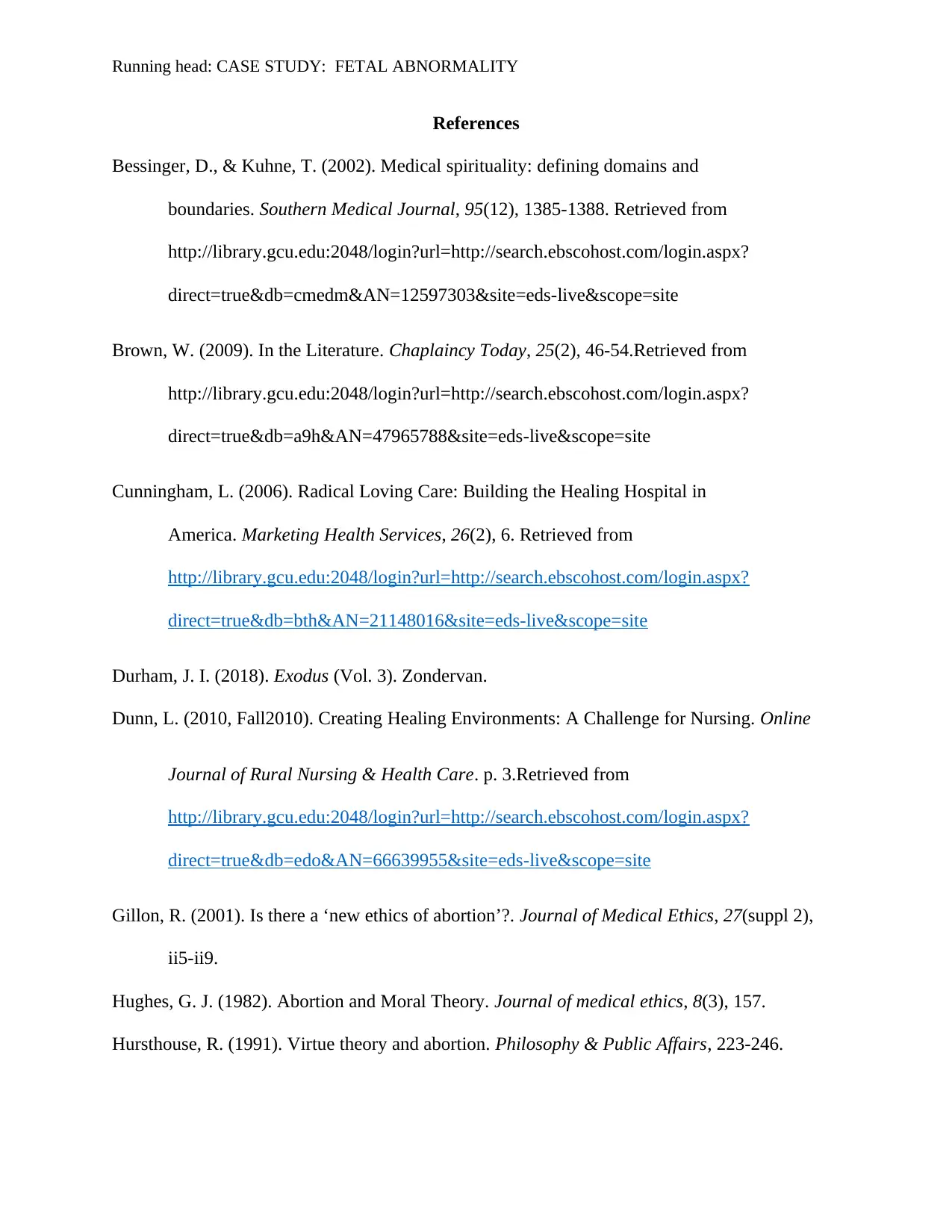
Running head: CASE STUDY: FETAL ABNORMALITY
References
Bessinger, D., & Kuhne, T. (2002). Medical spirituality: defining domains and
boundaries. Southern Medical Journal, 95(12), 1385-1388. Retrieved from
http://library.gcu.edu:2048/login?url=http://search.ebscohost.com/login.aspx?
direct=true&db=cmedm&AN=12597303&site=eds-live&scope=site
Brown, W. (2009). In the Literature. Chaplaincy Today, 25(2), 46-54.Retrieved from
http://library.gcu.edu:2048/login?url=http://search.ebscohost.com/login.aspx?
direct=true&db=a9h&AN=47965788&site=eds-live&scope=site
Cunningham, L. (2006). Radical Loving Care: Building the Healing Hospital in
America. Marketing Health Services, 26(2), 6. Retrieved from
http://library.gcu.edu:2048/login?url=http://search.ebscohost.com/login.aspx?
direct=true&db=bth&AN=21148016&site=eds-live&scope=site
Durham, J. I. (2018). Exodus (Vol. 3). Zondervan.
Dunn, L. (2010, Fall2010). Creating Healing Environments: A Challenge for Nursing. Online
Journal of Rural Nursing & Health Care. p. 3.Retrieved from
http://library.gcu.edu:2048/login?url=http://search.ebscohost.com/login.aspx?
direct=true&db=edo&AN=66639955&site=eds-live&scope=site
Gillon, R. (2001). Is there a ‘new ethics of abortion’?. Journal of Medical Ethics, 27(suppl 2),
ii5-ii9.
Hughes, G. J. (1982). Abortion and Moral Theory. Journal of medical ethics, 8(3), 157.
Hursthouse, R. (1991). Virtue theory and abortion. Philosophy & Public Affairs, 223-246.
References
Bessinger, D., & Kuhne, T. (2002). Medical spirituality: defining domains and
boundaries. Southern Medical Journal, 95(12), 1385-1388. Retrieved from
http://library.gcu.edu:2048/login?url=http://search.ebscohost.com/login.aspx?
direct=true&db=cmedm&AN=12597303&site=eds-live&scope=site
Brown, W. (2009). In the Literature. Chaplaincy Today, 25(2), 46-54.Retrieved from
http://library.gcu.edu:2048/login?url=http://search.ebscohost.com/login.aspx?
direct=true&db=a9h&AN=47965788&site=eds-live&scope=site
Cunningham, L. (2006). Radical Loving Care: Building the Healing Hospital in
America. Marketing Health Services, 26(2), 6. Retrieved from
http://library.gcu.edu:2048/login?url=http://search.ebscohost.com/login.aspx?
direct=true&db=bth&AN=21148016&site=eds-live&scope=site
Durham, J. I. (2018). Exodus (Vol. 3). Zondervan.
Dunn, L. (2010, Fall2010). Creating Healing Environments: A Challenge for Nursing. Online
Journal of Rural Nursing & Health Care. p. 3.Retrieved from
http://library.gcu.edu:2048/login?url=http://search.ebscohost.com/login.aspx?
direct=true&db=edo&AN=66639955&site=eds-live&scope=site
Gillon, R. (2001). Is there a ‘new ethics of abortion’?. Journal of Medical Ethics, 27(suppl 2),
ii5-ii9.
Hughes, G. J. (1982). Abortion and Moral Theory. Journal of medical ethics, 8(3), 157.
Hursthouse, R. (1991). Virtue theory and abortion. Philosophy & Public Affairs, 223-246.
⊘ This is a preview!⊘
Do you want full access?
Subscribe today to unlock all pages.

Trusted by 1+ million students worldwide

Running head: CASE STUDY: FETAL ABNORMALITY
1 out of 7
Related Documents
Your All-in-One AI-Powered Toolkit for Academic Success.
+13062052269
info@desklib.com
Available 24*7 on WhatsApp / Email
![[object Object]](/_next/static/media/star-bottom.7253800d.svg)
Unlock your academic potential
Copyright © 2020–2026 A2Z Services. All Rights Reserved. Developed and managed by ZUCOL.





